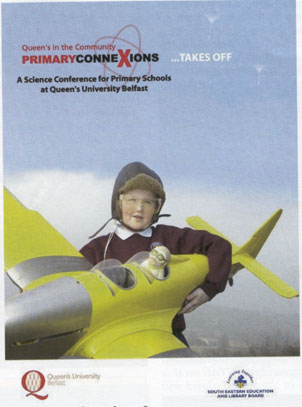| 2003 |

|
YEAR BOOK |
Department of Education, Northern Ireland
|
Challenges in science teaching in
Northern Ireland schools
|

|
� Improve science provision in all schools and colleges through the further development of self-evaluation procedures;
� Increase pupils' engagement with, and enjoyment of science, paticularly in the early years of post-primary education; � Help pupils become aware of the relevance of science in everyday life. |
In the year under review, significant progress has been made in a number of areas.
1.�The link between inspection and improvement; the value of self-evaluation in bringing about improvement in schools
In 2001, the Department of Education in Northern Ireland published the findings of a major survey on the teaching of science and technology in primary schools, in the report, A Survey of the Science and Technology Area of Study in a Sample of Northern Ireland Primary Schools (2000-1). In the third term of the 2001-02 academic year, inspectors made return visits to a sample of the schools included in the original survey. The report on the return visits highlighted the positive effects of the original survey in setting an agenda for improvement in science in individual schools. The report also highlighted the value of self-evaluation by schools as a means of bringing about improvement, and indicated the benefits of the Inspectorate working closely with schools and with the Curriculum Advisory and Support Service (CASS) in order to bring about improvements in learning and teaching and in the standards attained by the pupils. The findings of the survey serve to reinforce the importance of professional dialogue and co-operation, and self-evaluation, as key factors in promoting improvement in learning and teaching, and in raising the standards pupils achieve.
2.�The development of an electronic self-evaluation instrument to assist post-primary schools audit and develop their science provision
The Inter-Board Science Advisory Group (IBSAG), made up of representatives from the five Education and Library Boards (ELBs) in Northern Ireland, has worked effectively with the Inspectorate to develop the self-evaluation process in schools. IBSAG has developed further on-line self-evaluation materials to facilitate science departments, supported by their senior managers, in the monitoring and evaluating process. These materials help science departments to identify areas for improvement and to prepare appropriate action plans. The materials have been piloted and have helped science departments become more reflective of their own practice.
3.�The impact of Science Year activities in developing pupils' enjoyment of science
Science Year, which began in September 2001 and extended to May 2003, has provided an effective stimulus to heighten pupils' engagement with, and enjoyment of, science. The activities in Northern Ireland included conferences, lectures and a grants scheme which enabled schools, colleges and community groups to undertake innovative projects. An Inspectorate survey of the projects undertaken by schools during the year highlighted many successes. There is clear evidence that the profile of science in the schools is higher; that the pupils have enjoyed the practical and investigative activities; that staff morale has improved; and that parents are more engaged in supporting their children's science learning. New links with local industry have been forged by a number of schools. An additional outcome is that many more schools have identified science as a priority for action within their development plans.
4.�The development of a variety of useful initiatives that give pupils opportunities to experience science in everyday life
A number of organisations involved in science education in Northern Ireland have made significant contributions towards helping pupils to apply their scientific learning in real situations.
'Express Yourself' conferences, which are modelled on university research conferences, give pupils opportunities to present their research findings to an audience and to hear about the work of young science researchers. 'Hot Rot' - an investigation of the optimum conditions for composting; 'Super Soap' - a determination of the best soap for inhibiting the growth of micro-organisms; and 'Hypercoloured Jelly Babies' - adding E numbers for better colours, were the winning titles at 2002 conference.
'Primary ConneXions', an innovative science conference at Queen's University, provided pupils from the 14 primary schools with opportunities to present the findings of their school's project work. The 350 pupils who took part explored the theme 'Something in the Air'. The pupils eagerly developed their own ideas and experiments on the airborne spread of germs, how aircraft fly, and on noise pollution. The project showed that children are fascinated by engineering and science and love to study the world around them.
A series of conferences on primary science hosted by Sentinus, based at the University of Ulster, has provided over 1,000 pupils with opportunities to develop their problem solving skills in a real life context. The pupils enjoyed working in teams, interacting with mentors and suggesting creative solutions to the challenges set.
Much has been achieved in the year under review and much remains to be done. The main challenges ahead include: building on the momentum created by Science Year; determining the contribution of science to the proposed statutory curriculum; and developing more coherence in all aspects of science education, to ensure that all pupils benefit from the opportunities available.
Contact: Department of Education Northern Ireland,
Rathgael House, 43 Balloo Road, Bangor, Co Down BT19 7PR; Tel: 028 9127 9279